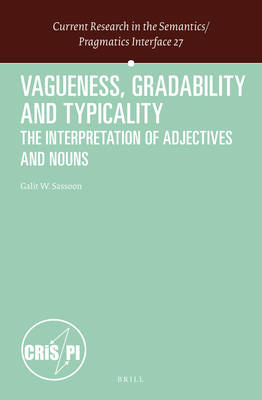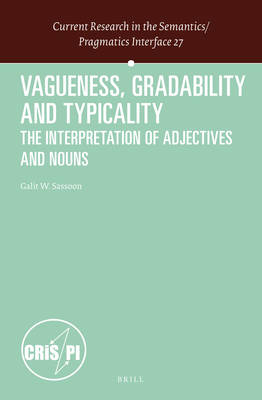
- Afhalen na 1 uur in een winkel met voorraad
- Gratis thuislevering in België vanaf € 30
- Ruim aanbod met 7 miljoen producten
- Afhalen na 1 uur in een winkel met voorraad
- Gratis thuislevering in België vanaf € 30
- Ruim aanbod met 7 miljoen producten
Zoeken
Vagueness, Gradability and Typicality
The Interpretation of Adjectives and Nouns
Galit Weidman Sassoon
€ 256,45
+ 512 punten
Omschrijving
This book presents a study of the connections between vagueness and gradability, and their different manifestations in adjectives (morphological gradability effects) and nouns (typicality effects). It addresses two opposing theoretical approaches from within formal semantics and cognitive psychology. These approaches rest on different, apparently contradictory pieces of data. For example, for psychologists nouns are linked with vague and gradable concepts, while for linguists they rarely are. This difference in approach has created an unfortunate gap between the semantic and psychological studies of the concepts denoted by nouns, as well as adjectives. The volume describes a wide range of relevant facts and theories. Psychological notions such as prototypes and dimensions are addressed with formal rigor and explicitness. Existing formal semantic accounts are examined against empirically established cognitive data. The result is a comprehensive unified approach. The book will be of interest to students and researchers working on the semantics and pragmatics of natural languages and their cognitive basis, the psychology of concepts, and the philosophy of language.
Specificaties
Betrokkenen
- Auteur(s):
- Uitgeverij:
Inhoud
- Aantal bladzijden:
- 446
- Taal:
- Engels
- Reeks:
- Reeksnummer:
- nr. 27
Eigenschappen
- Productcode (EAN):
- 9781781902639
- Verschijningsdatum:
- 14/03/2013
- Uitvoering:
- Hardcover
- Formaat:
- Genaaid
- Afmetingen:
- 160 mm x 241 mm
- Gewicht:
- 793 g

Alleen bij Standaard Boekhandel
+ 512 punten op je klantenkaart van Standaard Boekhandel
Beoordelingen
We publiceren alleen reviews die voldoen aan de voorwaarden voor reviews. Bekijk onze voorwaarden voor reviews.











